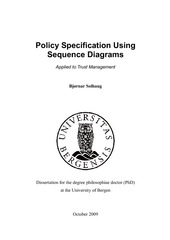Policy Specification Using Sequence Diagrams. Applied to Trust Management
Doctoral thesis

Permanent lenke
https://hdl.handle.net/1956/3723Utgivelsesdato
2009-10-23Metadata
Vis full innførselSamlinger
Sammendrag
With the ever increasing importance of computer networks such as the Internet, and the today almost ubiquitous online services, the needs for the management of these networks and services, as well as the management of the associated security, risk and trust are growing correspondingly. Policy based management of information systems has the last decade emerged as an adaptive and flexible approach to this challenge. Policies are rules governing the choices in the behavior of systems, the enforcement of which ensures that the system meets the relevant requirements. This thesis addresses the problem of capturing, specifying and developing policies. We propose a language suitable for the specification of policies across domains, at various abstraction levels, and that facilitates human interpretation. At the same time the language is underpinned by a formal semantics, allowing precise and rigorous analysis. Abstraction allows details about system functionality and architecture to be ignored, thus facilitating analysis and supporting understanding, which is beneficial and useful particularly during the initial phases of policy development. From the initial, abstract levels, a policy specification is typically further developed by adding details, making it more concrete and closer to implementation and enforcement. This thesis proposes a notion of policy refinement that relates policy specifications of different abstraction levels, precisely defining what it means that a low-level, concrete policy specification is a correct representation of a high-level, abstract specification. Refinement allows policy specifications to be developed in a stepwise and incremental manner, and ensures that the enforcement of the final, concrete specification implies the enforcement of the previous, more abstract specifications. The applicability of the approach is demonstrated within the domain of policy based trust management. The thesis proposes a method for the development of trust management policies that facilitates the modeling and analysis of trust within systems, and the evaluation of the risks and opportunities to which the system is exposed as a consequence of trust-based decisions. The method is supported by designated languages for the appropriate modeling and analyses, and aims at the capturing and formalization of policies the enforcement of which optimizes the trust-based decisions by minimizing risks and maximizing opportunities.
Består av
Paper 1: Solhaug, B.; Elgesem, D.; Stolen, K., 2007, Why trust is not proportional to risk, pp. 11-18. In: Second International Conference on Availability, Reliability and Security (ARES'07). Copyright 2007 IEEE. Reproduced with permission. Published version. The published version is also available at: http://dx.doi.org/10.1109/ARES.2007.161Paper 2: Solhaug, B.; Elgesem, D.; Stolen, K., Specifying policies using UML sequence diagrams – An evaluation based on a case study, 34 p. SINTEF A1230. Trondheim : SINTEF ICT, 2009. Reproduced with permission. Published version.
Paper 3: Telektronikk 105(1), Solhaug, B.; Johannessen, T. H., Specification of policies using UML sequence diagrams, pp. 90-97. Copyright 2009 Telenor ASA. Reproduced with permission. Published version.
Paper 4: Solhaug, B.; Stolen, K., Compositional refinement of policies in UML – Exemplified for access control, 33 p. SINTEF A11359. Trondheim : SINTEF ICT, 2009. Reproduced with permission. Published version.
Paper 5: Software and Systems Modeling 2009 8(1), Seehusen, F.; Solhaug, B.; Stolen, K., Adherence preserving refinement of trace-set properties in STAIRS: exemplified for information flow properties and policies, pp. 45–65. Copyright 2008 Springer-Verlag. Full text not available in BORA due to publisher restrictions. The published version is available at: http://dx.doi.org/10.1007/s10270-008-0102-3
Paper 6: Solhaug, B.; Stolen, K., Preservation of policy adherence under refinement, 57 p. SINTEF A11358. Trondheim : SINTEF ICT, 2009. Reproduced with permission. Published version.
Paper 7: Refsdal, A.; Solhaug, B.; Stolen, K., A UML-based method for the development of policies to support trust management, pp. 33-49. In: Karabulut, Y.; Mitchell, J.; Herrmann, P.; Jensen, C. D., Trust Management II. Proceedings of IFIPTM 2008: Joint iTrust and PST Conferences on Privacy, Trust Management and Security, June 18-20, 2008, Trondheim, Norway. IFIP 263. Copyright 2008 by International Federation for Information Processing. Published by Springer Science+Business Media. Full text not available in BORA due to publisher restrictions. The published version is available at: http://dx.doi.org/10.1007/978-0-387-09428-1_3